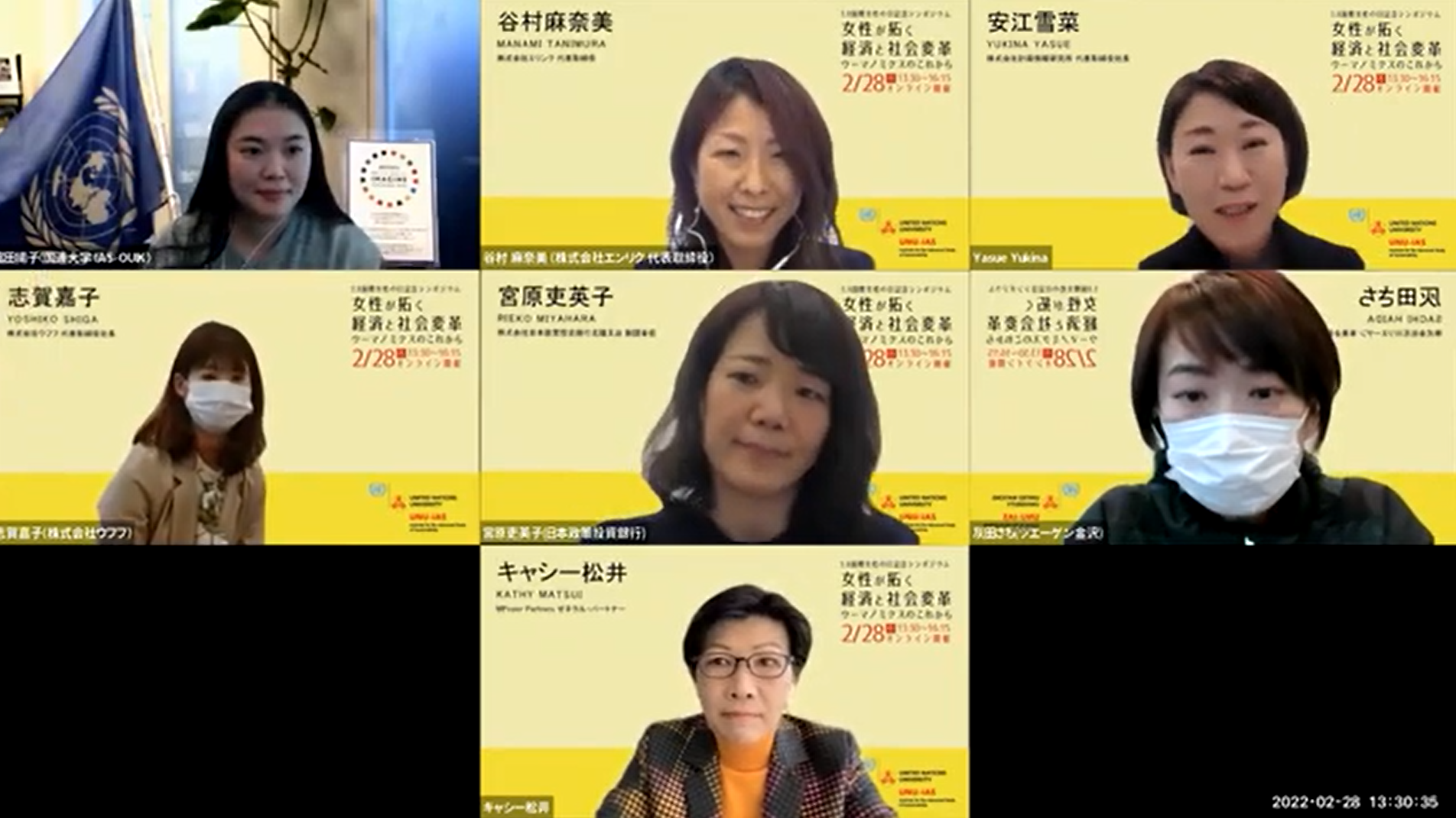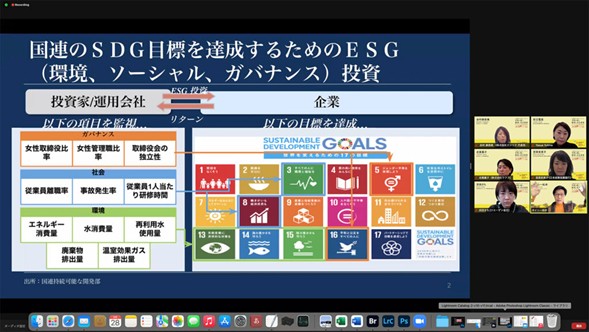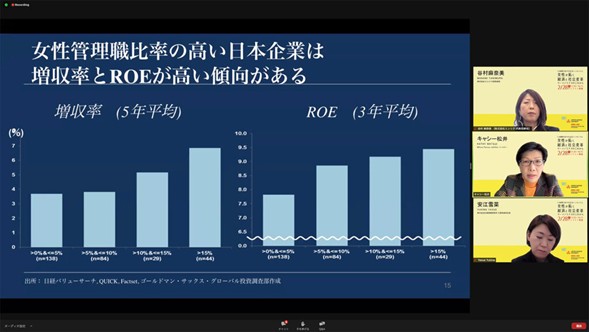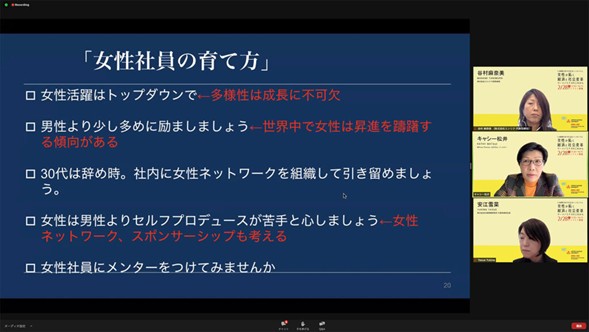March 8th is recognized by the United Nations as “International Women’s Day.” Recently, OUIK held a symposium to commemorate this occasion.
We invited Kathy Matsui, who proposed the concept of “Womenomics” to the world, to speak about its significance and the changes occurring in society due to ESG (Environmental, Social, and Governance) investing, which now holds considerable influence over the global economy.
In the second part of the event, we welcomed four women actively working in the Hokuriku region to discuss strategies for linking women’s empowerment with economic growth in the area. While Hokuriku has a high female employment rate, it still faces challenges in creating a supportive environment for women’s advancement. With a shrinking labor force and the increasing necessity for companies to contribute to the Sustainable Development Goals (SDGs), we believe it is crucial to promote the message that empowering women can drive economic growth.
(*1)*Note: As more opportunities arise for women to participate in the workforce, it can become a significant engine for economic growth. This concept was proposed as “Womenomics” by Kathy Matsui in 1999. In 2012, the Japanese government adopted it as a key component of its economic growth strategy, leading to increased attention on the potential of women’s contributions to the economy.
Transforming Society Through ESG Investing
Kathy Matsui began by discussing the current state of ESG investing and its future prospects.
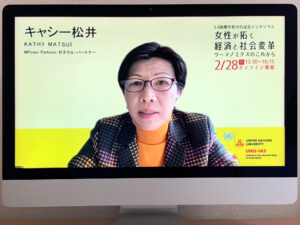
Kathy Matsui (General Partner at MPower Partners) is a former Vice Chair and Chief Japan Stock Strategist at Goldman Sachs. She holds degrees from Harvard University and Johns Hopkins University.
She highlighted three key reasons for the growing focus on ESG:
-
Unlocking New Business Opportunities: When the growth potential of existing markets slows, traditional boardrooms dominated by men may struggle to generate innovative ideas for new product development and market expansion. By incorporating diverse perspectives from individuals with different backgrounds, including women, businesses can enhance decision-making processes and unlock new opportunities.
-
Reducing Risk Factors: Different backgrounds can help identify a broader range of risks. ESG considerations not only open doors to new business avenues but also play a crucial role in minimizing risks.
- Competitive Advantage: In a world where the future is unpredictable, adopting ESG practices is essential for enhancing competitiveness.
Young people today place significant importance on a company’s social contributions and values. Kathy Matsui notes, “In order to attract talented individuals, it is becoming increasingly important to adopt ESG principles and practices.”
“While ESG investing once yielded low returns, it is now becoming clear that it can provide above-average, and even higher, returns. As a result, ESG investments have been growing rapidly within the financial sector.”
Before the COVID-19 pandemic, there was a higher focus on the ‘E’ (Environment) and ‘G’ (Governance) aspects of ESG, whereas ‘S’ (Social) received less attention due to the challenges of quantifying it and its broad scope. However, with the pandemic, issues such as poverty, single motherhood, and mental health have gained heightened visibility, leading Matsui to believe that interest in the ‘S’ aspect will continue to increase in the future.
(*2) ESG refers to a framework within the market (capital markets) designed to achieve the goals of the Sustainable Development Goals (SDGs)
The Significance of Womenomics
Next, Kathy Matsui spoke about Womenomics.
It is estimated that Japan’s workforce will decrease by 40% by 2055. Solutions to the demographic challenges are limited to three options: 1) increasing the birth rate, 2) expanding the acceptance of foreign workers, and 3) raising the participation rate of the existing workforce. Matsui believes that “since options 1 and 2 will take considerable time, we should focus on 3, and I think the group that can contribute the most is women.”
Since around 2013, the employment rate of women in Japan has risen rapidly, surpassing levels seen in the United States and Europe. While many newly employed women are in non-regular positions, it is believed that if Japan can eliminate gender disparities in the employment rate and reduce working hour differences to the average level of OECD countries, the GDP could potentially increase by about 15%.
A study comparing the profitability of the largest 500 companies in the U.S. found that companies without female board members performed significantly worse than those with three or more. Similarly, data indicates that in Japanese companies, the higher the ratio of female managers, the greater the revenue growth and return on equity. This is thought to be related to the diverse perspectives that women bring to leadership. Matsui adds, “Conversely, I believe having an all-female board would not be effective either.”
“There are some who believe that diversity is troublesome, time-consuming, and ultimately not very meaningful. However, by providing objective analyses and evidence like this, we can persuade them,” she said. Matsui emphasized that diversity in thinking—not just gender diversity—can drive innovation, achieve sustainable growth, and reduce risks.
How to Nurture Female Employees
Diversity has traditionally been viewed primarily from the perspective of equality. However, when the Japanese government began discussing it as a “driver of growth,” this shifted awareness significantly, leading to a deeper understanding of why diversity is essential. Despite grasping the “why,” many still struggle with the “how,” prompting numerous requests for guidance to Kathy Matsui. In response, she published a book titled How to Nurture Female Employees (published by Chuo Koron Shinsha).
She shared several insights from her personal experience on how to nurture female employees, including: “Many women struggle with self-confidence, so it’s important to encourage them a little more than you might with men,” “Consider sponsorship that fosters a sense of being valued and loved,” and “When it comes to feedback, women tend to take constructive criticism more seriously. Since many women are perfectionists, it’s also crucial to highlight their strengths and offer positive reinforcement.” She concluded her talk by offering these valuable tips.
How to make women’s empowerment the engine of the Hokuriku region’s economy
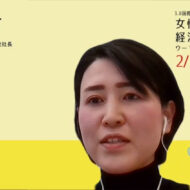
Yoshiko Shiga (President and CEO of UFUFU Co., Ltd.) opens “Ufufu Donuts” Shop in Kanazawa, Hiyasu district in 2015
In the latter half of the panel discussion, we welcomed four guests: Yoshiko Shiga (CEO, UFUFU Co., Ltd. ), Manami Tanimura (Managing Director, Erinku Co., Ltd.), Sachi Haida (Deputy General Manager of the Business Planning Department and Hometown Promotion Office, Ishikawa Zweigen, Inc.) and Rieko Miyahara (Assistant to Director, Hokuriku Bureau Planning and Coordination Division, Development Bank of Japan Inc.)
Ms. Shiga, who started her own company producing handmade donuts, expressed that many moms returning to work feel it is a waste to limit their job choices to available working hours, regardless of their career. She shared her thoughts, stating, “Our internal environment stimulates and encourages everyone to strive harder. If each of us focuses on what we believe are the biggest challenges in society, I believe we can make the world a better place,” emphasizing her vision for a society where women can thrive.
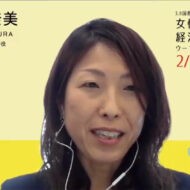
Manami Tanimura (Managing Director, Erinku Co., Ltd.), is also a member of the NPO General Research Institute for Accessibility, where she provides support for the daily lives of residents.
Ms. Tanimura founded a real estate company that provides housing for those facing difficulties, such as single-parent families, the elderly, and individuals on welfare. Her decision to start her own company stemmed from a painful experience at a previous real estate firm where she witnessed the rejection of tenants in need. She shared, “I am doing what I want to do. If I can engage in what I love and keep myself smiling, I believe that seeing me happy, the children can get inspired as well.” She reflected on her journey as a single mother dedicated to her work.

Sachi Haida (Deputy General Manager of the Business Planning Department and Hometown Promotion Office, Ishikawa Zweigen, Inc.) engages in social contribution Activities that Connect Local Businesses, Organizations, Athletes, Supporters, and Government
During her high school years, Ms. Haida witnessed the power of sports to connect local people. Since then, she has aimed to become a club staff member, and after spending five years with Sanfrecce Hiroshima, she joined Zweigen Kanazawa in 2018. Achieving her dream in her hometown, she is dedicated to enhancing the lives of people in the community through J.League social engagement activities. Zweigen Kanazawa’s club philosophy is “Embracing challenges as part of this city’s tradition.” They want to make the mindset of facing challenges a new tradition in the city while showing their own commitment to taking on challenges.
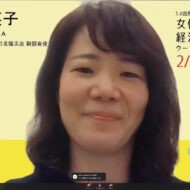
Rieko Miyahara (Assistant to Director, Hokuriku Bureau Planning and Coordination Division, Development Bank of Japan Inc.) is a member of the Women’s Empowerment Working Group of the Hokuriku Economic Federation and serves on the Takaoka City Administrative Reform Citizen Advisory Council, among other roles.
Since 2012, Mr. Miyahara has been researching women’s employment and work styles in the Hokuriku region with the theme of “Empowering Women in Hokuriku.” The Hokuriku region boasts a diverse workforce of all ages and genders, with a high female labor force participation rate. However, the percentage of women in managerial positions is low, indicating that there are still significant challenges in terms of work styles and engagement. Mr. Miyahara states, “I believe that taking a step towards diversity starts with women being the closest to that concept. By returning to the basics and reflecting on how we can effectively leverage women’s strengths, I hope we can look back and expand our efforts in this region.” He has provided insights on the potential of women in Hokuriku based on data.
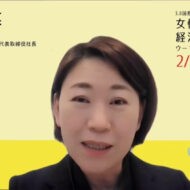
Yukina Yasue (CEO of Research Institute of City Planning and Communication Co., Ltd.) is dedicated to developing a flexible working environment and fostering a work culture that allows employees to enjoy their jobs, with women making up half of the workforce.
“Creating a workplace that is friendly to women involves not only improving systems but also fostering an environment where they can engage in meaningful work and pursue what they love,” says Yasue.
“We discussed how to connect two major themes: women’s empowerment and ESG investment. I feel that individuals from diverse backgrounds, especially women, are becoming the driving force in bridging these two areas. The significance of women’s participation is not tied to traditional business models, but rather to co-creating new value. I hope to see more businesses emerging that reflect this perspective,” Yasue concluded, wrapping up the panel discussion.
The event is available in the video below.


